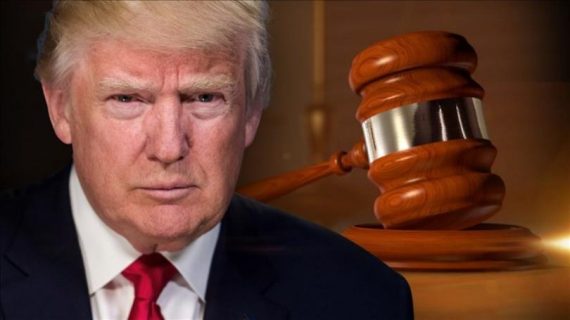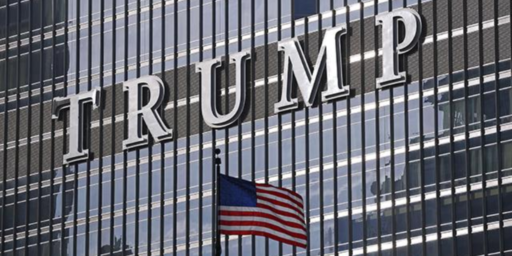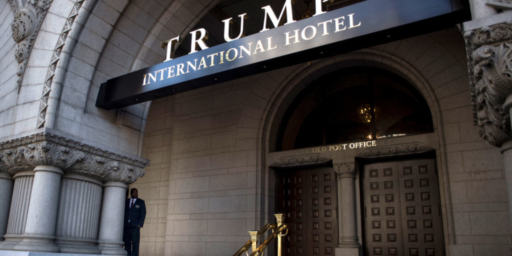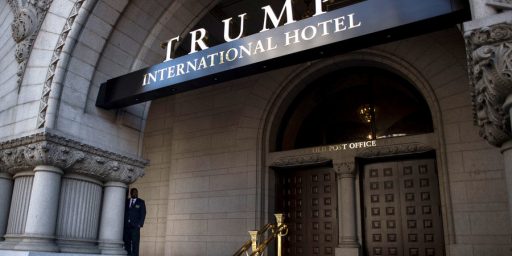Maryland and Washington, D.C. Sue Trump Over Alleged Emoluments Clause Violations
Maryland and the District of Columbia are suing President Trump based on alleged violations of two provisions of the Constitution that have never been litigated before.
The Attorneys General of Maryland and the District of Columbia have filed a lawsuit against President Trump alleging that he is violating the Emoluments Clauses of the Constitution due to the fact that foreign officials are spending money at his hotels while he is serving as President:
In a new legal challenge to President Trump, the Democratic attorneys general of Maryland and the District of Columbia filed a lawsuit on Monday claiming that the president’s failure to shed his businesses has undermined public trust and violated constitutional bans against self-dealing.
The complaint, filed in a Maryland federal court, makes many of the same arguments as a lawsuit filed this year by a Washington watchdog organization in a New York federal court. But some legal experts said the new suit may progress further because the plaintiffs were government entities, which could have stronger standing to sue the president.
It is part of a broader effort by Mr. Trump’s critics to force him to defend his continued ownership of his business empire. Some congressional Democrats are expected to file a third suit as early as this week arguing that his behavior is also unconstitutional.
The Constitution prohibits federal officials from accepting gifts or emoluments from foreign governments. It also prohibits the president from accepting economic benefits or emoluments from the federal or state governments, other than his salary. But in 230 years, no court has interpreted what exactly constitutes an emolument.
Brian E. Frosh, the Maryland attorney general, said if the lawsuit progressed to the discovery phase, he and Karl Racine, the attorney general for the District of Columbia, would seek to obtain the president’s tax returns to gauge the extent of his business dealings.
“It is unprecedented that the American people must question day after day whether decisions are made and actions are taken to benefit the United States or to benefit Donald Trump,” he said. “The president’s conflicts of interest threaten our democracy.”
The Justice Department had no immediate response. But in a brief filed last week in response to the New York case, the department argued that the earlier suit should be dismissed because the emoluments clauses were never intended to prohibit a president from owning a business while in office. Even if the president had violated those prohibitions, the department’s lawyers contended, it is up to Congress, not a federal judge, to act. They also argued that the plaintiffs had shown no financial harm.
In a statement, the Republican National Committee called the new lawsuit “absurd.” Lindsay Jancek, a spokeswoman, said, “The actions by the attorneys general represent the kind of partisan grandstanding voters across the country have come to despise.”
Monday’s complaint claims that businesses owned by Mr. Trump divert customers away from businesses that the District of Columbia and Maryland either own, license or tax, harming those governments financially. For example, it contends, the Trump International Hotel in Washington competes with facilities owned or operated by the city’s government, including the Walter E. Washington Convention Center, its armory and its Carnegie Library. It also competes with a government-owned conference center in Bethesda, Md., and a resort in Prince George’s County, Md., that generates tax revenue for the state, the suit claims.
Mr. Racine told reporters on Monday that just as states intervened to challenge Mr. Trump’s efforts to limit travel from predominantly Muslim countries, he hoped to force the court to step in and evaluate Mr. Trump’s business entanglements.
“Congress has given the president a total pass,” he said. “State attorney generals are serving as a necessary check and balance in the Trump era where others failed.”
The suit also claims that the president has used his position to help his businesses. His visits to the Trump hotel have raised the business’s profile, the suit claims, and put competitors at a disadvantage. Although Mr. Trump’s businesses pay taxes, it states that over all, his business interests threaten revenue on which Maryland and the District of Columbia depend.
Moreover, the suit claims, the president’s business dealings create an “intolerable dilemma” for governments like Maryland and the District of Columbia. If they refuse requests from the Trump Organization for concessions because they are too costly or against the public interest, the company could turn to states more willing to grant favors.
The Justice Department argues the emoluments clauses should be narrowly construed to prohibit the president from accepting gifts or payments in his official capacity. It does not extend to ordinary commercial arms-length transactions like hotel stays, the department contends. Mr. Trump’s defenders claim he has taken every reasonable step to distance himself from the Trump Organization, the family company now run by his adult sons.
The Washington Post has more:
The constitutional question D.C. and Maryland will put before a federal judge is whether Trump’s business holdings amount to violations of parts of the Constitution known as the foreign and domestic emoluments clauses.
To guard against foreign countries gaining sway over the new republic’s ambassadors in the late 1700s, drafters of the Constitution prohibited any “Person holding any Office of Profit or Trust” from accepting “any present, Emolument, Office or Title, of any kind whatever, from any King, Prince, or foreign State.”
In another part of the Constitution, framers sought to prevent a president from favoring one state over another, forbidding him from receiving any gift or emolument from a state and, instead, only the compensation approved by Congress.
The lawsuit, filed in U.S. District Court for the District of Maryland, is the latest and most significant legal challenge to Trump over the issue of emoluments. The first was filed in January by Citizens for Responsibility and Ethics in Washington, a D.C.-based watchdog group. In March, a D.C. restaurant sued Trump, alleging the new Trump International Hotel in D.C. benefits from unfair advantages because of its close association with the president. And last week, a group of Democratic members of Congress said they plan to file suit soon. Each, however, has faced legal hurdles over standing to sue the president.
In the Trump administration’s most detailed response yet, the Department of Justice filed a 70-page legal brief on Friday arguing the CREW lawsuit should be dismissed. The administration said Trump’s businesses are legally permitted to accept payments from foreign governments while he is in office. The filing held up the lack of past complaints — going all the way back to farm produce sold abroad by George Washington — to assert that market-rate payments for Trump’s real estate, hotel and golf companies do not constitute emoluments as defined by the Constitution.
Racine and Frosh, however, argue Trump’s violations are on scale never seen before and that both D.C. and Maryland are being adversely affected by the Trump hotel near the White House.
After hiring staff and holding events to cater to foreign diplomats, the Embassy of Kuwait held an event at the hotel, switching its initial booking from the Four Seasons. Saudi Arabia, the destination of Trump’s first trip abroad, also booked rooms at the hotel through an intermediary on more than one occasion since Trump’s inauguration. Turkey held a state-sponsored event there last month. And in April, the ambassador of Georgia stayed at the hotel and tweeted his compliments. Trump himself has appeared at the hotel and greeted guests repeatedly since becoming president
As a result, the hotel may be drawing business away from the taxpayer-owned D.C. convention center and one in nearby Maryland subsidized by taxpayers, Frosh and Racine argue.
Norman Eisen, who served as the chief White House ethics lawyer for President Barack Obama and is CREW’s board chairman, said jurisdictions such as the District and Maryland are among the “most perfect plaintiffs” to sue over emoluments because they have a say in making sure the Constitution is being enforced.
“In the emoluments clauses, we have these ancient air bags that were placed in the Constitution by the framers that are now being deployed,” said Eisen, whose nonprofit has been advising the District and Maryland on their suit. “Trump is the framers’ worst-case scenario; a president who would seize office and attempt to exploit his position for personal financial gain with every governmental entity imaginable, across the United States or around the world.”
On the domestic side, the suit alleges Trump has received unconstitutional financial favors from the U.S. government. It says the U.S. General Services Administration, which handles federal real estate, wrongly allowed Trump’s company to continue to lease the Old Post Office building, where Trump built his D.C. hotel, even though a clause in the contract said no elected official could remain on the lease.
The GSA initially said Trump would have to fully divest from the hotel after the election. But after Trump proposed increasing GSA’s budget, the suit says, the agency issued a letter saying Trump was in full compliance.
The suit also alleges that Trump is violating domestic emoluments by creating a situation in which states feel compelled to compete for Trump’s favor, perhaps by offering zoning exemptions, waivers or other benefits to help his businesses.
After initially saying the Trump organization would not pursue new deals while he was in office, Trump’s sons announced last week that the company would begin building a network of new hotels in mostly red states that he won in last year’s election.
The suit by D.C. and Maryland says the two jurisdictions are faced with an “intolerable dilemma”: to either go along with the Trump Organization getting special treatment, including possible lost local revenue, or “deny such requests and be placed at a disadvantage vis-à-vis states and other government entities that have granted or will agree to such concessions.”
The lawsuit filed by Maryland and D.C. are based on two separate parts of the Constitution aimed at preventing Federal officials, including Members of Congress, Senators, and Executive Branch officials from receiving benefits from foreign and domestic governments while in office. The first provision, which the lawsuit refers to as the “Foreign Emoluments Clause” is found in Article I, Section Nine, Clause 8 of the Constitution and prohibits any Federal official from receiving without Congressional consent “any present, Emolument, Office, or Title, of any kind whatever, from any King, Prince or foreign State.” The second clause, which the Complaint refers to as the “Domestic Emoluments Clause” can be found in Article II, Section 1, Clause 7 and states that the President “shall not receive within that Period any other Emolument from the United States or any of them.” Generally speaking, an “emolument” is defined as ” the returns arising from office or employment usually in the form of compensation or perquisites.” As noted, there is no record that these clauses of the Constitution have been raised or litigated with respect to any President since George Washington first took the Oath of Office in 1789 and no record of any legal proceeding in which a court of record has ruled on the application of these clauses in any specific case. Despite this fact, there is a long history of Presidents of the United States receiving gifts, including gifts that potentially have significant value, from foreign leaders and foreign nations. Typically, these gifts are given as part of official visits by foreign heads of government or heads of state to the United States, or official visits of the President to foreign nations during his time in office. Under a strict reading of the Foreign Emoluments Clause, these gifts would appear to be barred, but rather than being prosecuted for accepting them previous Presidents have been permitted to receive them as long as they are properly reported by the White House. At the very least, though, this history raise legitimate questions about what the clauses mean and whether they are being violated in this case.
One potential argument against the allegations that are being raised both in this case and in the lawsuits filed by individuals and watchdog groups is that the fact that foreign nations and foreign government officials are spending money isn’t necessarily a violation of the Foreign Emoluments Clause because the payments in the form of hotel bills and the like aren’t being paid directly to Trump himself. According to multiple reports, the assets of what is known as “The Trump Organization” are earned by a huge list of private entities that include closely-held corporations, LLCs, and limited and general partnerships. While it’s true that Donald Trump has long been, and to this day remains, the primary owner of all of these entities and therefore benefits from the profits that they enjoy, the entities themselves are made not to Trump as an individual but to the hotels and resorts individual, each one of which is apparently owned and/or operated by one of the 500 or more legal entities that make up the “The Trump Organization.” One could argue, of course, that if the intent of the clauses in question were to prevent the President and other government officials from being given payments that might influence their decision making that it should not matter whether the payments were received directly or indirectly through a business. However, the fact that the payments were not made to Trump directly and that there is, at least a present, an argument that any policy changes have been made in exchange for them seem to be support for the argument that earnings by a President’s business are not covered by the clauses regardless of the potential intent of the people who patronized those businesses.
Before we even get to the issue of what the emoluments clause mean and whether they have been violated here, there is a threshold question of whether or not Maryland and the District of Columbia have standing to raise the issue at all. The lawsuit alleges that the relationship between the President and The Trump Organization put the two governments in a situation where they are either required to provide favors to Trump-related business entities or face the prospect of some unstated damage as a result of not providing those favors. While this may be a sufficient allegation of damages to get beyond a Motion to Dismiss it’s unclear to me that this is a sufficient basis upon which to argue that either Maryland or Washington, D.C. has the standing to bring a lawsuit alleging a violation of either of these clauses of the Constitution. Indeed there may not be any private or public entity that would have the standing to raise this issue, meaning that it could only be raised as part of an impeachment proceeding that originates in Congress assuming that there are even the facts to support the charges the lawsuit makes.
In any case, there really isn’t any way to predict how this case will be handled by the District Court or any appellate court that may eventually hear the case. The fact that there is no prior history of the clause in question being enforced, and no Court rulings in which the proper application of these clauses was discussed, means that this is quite literally a case of first impression that could end up being litigated for several years before we even get to the threshold legal issue of whether or not renting space at a Trump-owned business while Donald Trump is President constitutes a violation of the clause in question.
Here’s the Complaint:
District of Columbia Et Al v. Trump by Doug Mataconis on Scribd






When Lex Luthor was elected president in DC Comics, he sold his family business, LexCorp, so he wouldn’t have any conflicts of interest.
An actual comic book super villain is more ethical than our President. Also, President Luthor had better hair.
IANAL and I have no idea whether MD and DC have standing. I also have no idea what might be found to be an emolument. I do think that if your businesses are to complicated to unwind and putting them in a real blind trust will kill the value of your personal brand, you should have declined to run for President. If the case goes forward and his tax returns are subpoenaed I expect Trump will settle before turning over the returns.
I also have no idea whether members of the administration can refuse to answer questions from a Senate committee without claiming privilege or the fifth. I do think it’s time for those with responsibility for such matters to consider what they will do when Trump and his minions simply refuse to honor court orders.
The goal here isn’t so much to achieve the ostensibly desired outcome (divestiture). Although that would be nice, it would take years to accomplish (if indeed the plaintiffs even managed to prevail) and Trump would probably be out of the White House before the litigation was finally concluded (which would render the lawsuit moot).
The goal is to utilize the discovery process. You can guess what for …
Thank you for addressing this. I have been wondering if they had standing on this, and if any entity did. Not being a lawyer, I had no information to build an opinion on. I appreciate seeing the opinions of those who know more about the field.
The fact that Trump had an order of magnitude more conflicts of interest than all other candidates for President combined was widely ignored by a certain low-IQ segment of our population.
@HarvardLaw92:
You are right on there. But is there any chance it succeeds?
I’m not optimistic.
@Davebo:
Hard to say. The concept is certainly novel. It’s untested legal waters and those go as they go. They’re unpredictable & a matter largely of which trial judge gets the initial filing, so realistically 50/50 chance IMO it survives an MTD.
Constitutionally here, you essentially have one co-equal sovereign suing another, so if a state doesn’t have standing, I can’t imagine that any entity would. It would essentially render the clauses unenforceable outside of impeachment.
@Davebo:
Note as well that there is a fourth lawsuit set to be filed in D.C. today, by some 184 (at last count) Democratic members of Congress acting in their official capacities. If nothing else, the question of standing in an emoluments matter will certainly have been thoroughly investigated and it will keep Trump even further crippled and distracted for the foreseeable future. 🙂
@HarvardLaw92: I think that’s the general idea. Forcing DT to provide his tax returns could simply be portrayed as helping him to carry out a campaign pledge.
@HarvardLaw92:
I’m not sure it’s Trump who is distracted, but rather us.
Case in point – the plan to ram the Trumpcare legislation through the Senate while everyone is focused on Comey. Similarly net neutrality, environmental destruction, selling off public lands, etc. All this focus on emoluments/corruption/treason stuff distracts the media from the actual damage being done today.
This is all about using discovery to get Trump’s tax return (which they may manage to get).
There is no violation of the emoluments clause. The first five presidents operated their plantations while President, and sold farm products overseas, including to foreign governments (like tobacco sold to foreign militaries). Such market sales by a private business of a president are not treated as emoluments.
Obama would have been in violation of the emoluments clause under this lawsuit’s theory, since he sold copies of his books to foreign public libraries while in office, and obtained copyrights from foreign governments while president.
Many perfectly honest government officials and civil servants might be in violation under this theory, for holding stock in New York Stock-exchange traded stock in enterprises owned partly by foreign governments. Or maybe even for just holding in their federal retirement (Thrift Savings Plan) funds that hold stock in foreign state-owned enterprises.
@Tony W:
Surprisingly little legislation is getting through Congress. I take that to indicate that the chaos we’re creating for the GOP (and the internal divisions) are performing as intended.
@Passerby:
I think you meant to say “[have] not [to date been] treated as emoluments”. As I said above, this is untested legal territory. Things are legal until they aren’t, and while it’s a long shot IMO, this could end up going somewhere nobody expects.
Non sequitur. Obama doesn’t sell books. Publishers sell books to wholesalers, who sell them to retailers, who sell them to consumers. Obama just collects a royalty on sales from which he is removed by at least three transactional levels. He has no control over pricing, and indeed no knowledge of who may or may not be buying the underlying products which generate the royalties.
Block payments made to all similarly situated parties (for example: dividends) do not constitute emoluments or gifts, as the party making the payments has no way of extending a disproportionate benefit to selected recipients. Trade discounts and benefits available to the general public are not problematic.
That having been said, agencies which are responsible for oversight with respect to the market are subject to heightened restrictions (i.e. banned securities lists). SEC actually publishes a list of securities which its employees can’t own. We actually just went through an ethics review regarding employees in NY who were forced to cede gains on such stocks to the government, and historically, stocks sold by SEC employees underperform the market by about 8%.
Funds like TSP, et al, do not count, as the individual investor has no control over the mix of underlying securities which make up the fund basket.
Passerby’s claims about the travel ban weren’t particularly helpful here:
https://www.outsidethebeltway.com/appeals-court-denies-federal-governments-request-for-stay-of-travel-ban-order/
More of the same, I see.
I welcome any opportunity for a forensic accounting. And that would go well beyond tax returns, which are necessarily incomplete and can be dishonest.
This should be more about following the money trail and seeing where it leads. I would not be surprised if we find that Trump is laundering money for Putin’s friends.
As long as Republicans in Congress remain supine it’s going to fall to the States to try and do something, anything, about this abomination that a fluke of Electoral College math has inflicted us with..
@HarvardLaw92:
Yea I get that. In fact, they said as much in their press conference.
The problem with that is that admitting when you file the lawsuit that the purpose of the lawsuit is to utilize discovery for ulterior motives could come back to bite them in their ass.
@Tony W: I don’t know who the “everyone” is that you refer to and it is not true that the “media” has ignored this. The more pertinent questions are what are the most efficacious means of publicizing them and making the Republicans pay for these travesties when they pass. In case you haven’t noticed, the Republicans hold both houses of Congress.
@Doug Mataconis:
Ulterior motives is a matter of perspective and potential bias. The returns themselves are primary to the cause of action, so there is a justifiable basis for requesting them.
They’d almost certainly be submitted under seal in any case, so there is little danger of them being leaked / becoming public.
Law enforcement gaining access to them / referral for investigation premised on possibly unrelated irregularities discovered within the process of investigating the primary objective? Who can say? … 😀